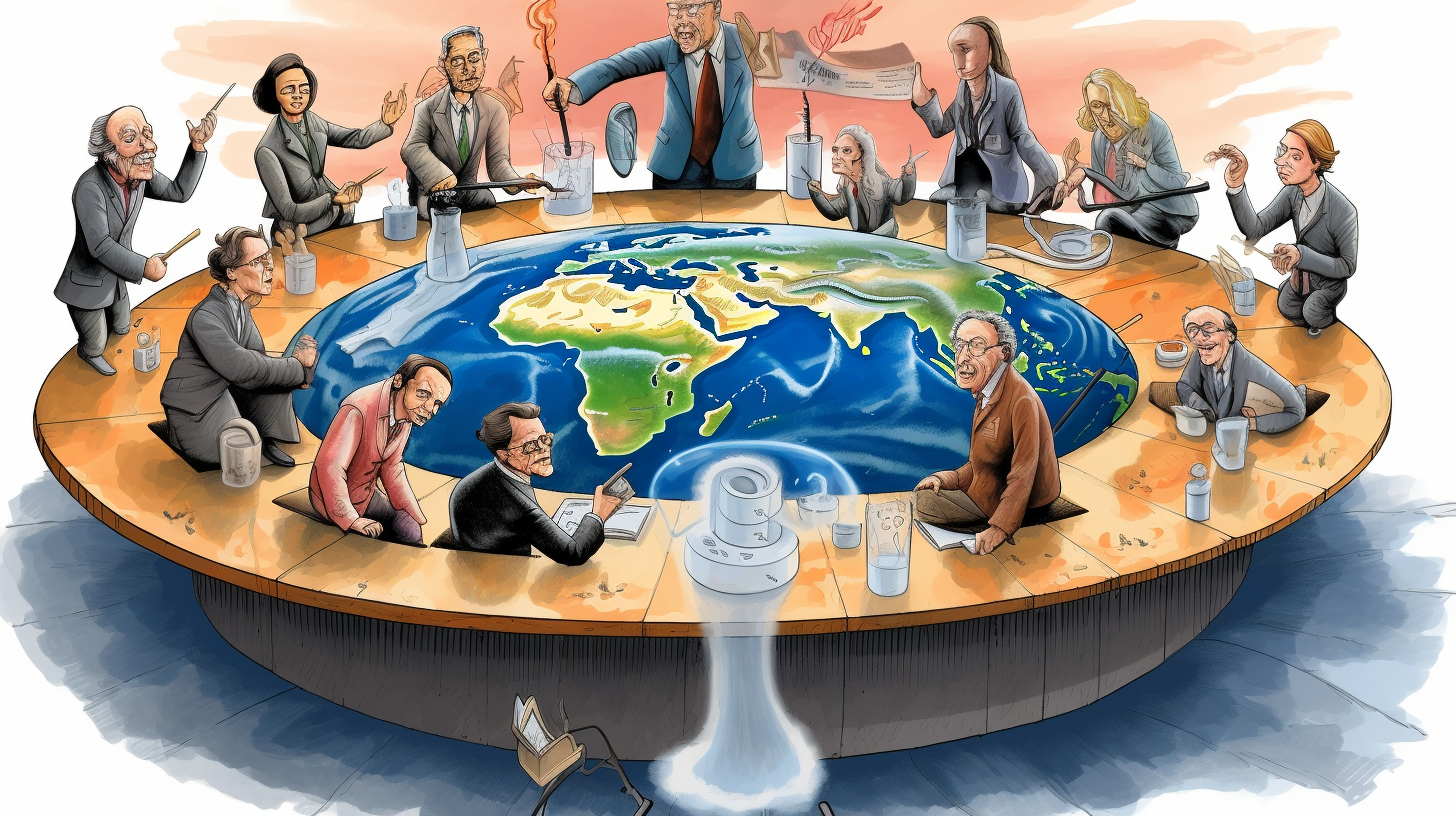https://www.youtube.com/watch?v=HgM1yhwj1mg
Summary
'In questo discorso, pronunciato alla Decima Conferenza Internazionale sul Cambiamento Climatico nel 2015, William Briggs discute di come le convinzioni delle persone diventino parte della loro identità. Inizia discutendo le differenze tra scienziati e civili. Se a un civile viene insegnato che la terra ruota attorno al sole, di solito ci crede. I civili si fidano della parola di uno scienziato, anche se non capiscono la meccanica orbitale. Questa convinzione è relativamente poco importante per la loro vita quotidiana, comunque. Contrappone questo con la convinzione che molti civili hanno sugli UFO. La maggior parte degli esperti è in disaccordo. La differenza tra il movimento planetario e gli UFO è che questo è qualcosa in cui vogliono credere. Fa parte della loro identità credere negli UFO. Quando gli esperti discutono contro gli UFO, può effettivamente rafforzare la loro convinzione. Ma a parte annoiare i loro ospiti a cena, è comunque una convinzione relativamente innocua. Solo perché qualcuno ha il desiderio di credere in qualcosa (che gli aerei volano o una pillola cura una malattia) non è logicamente o psicologicamente sbagliato. Le persone credono in queste cose perché le hanno viste funzionare. Che gli scienziati siano d'accordo è confortante, ma non essenziale. Quando si tratta di cambiamento climatico, i civili spesso sono fortemente in disaccordo con gli esperti veri e propri. E c'è una tale varietà di opinioni tra gli esperti che è sorprendente che si possa dire qualcosa di utile sul cambiamento climatico. Le persone senza alcuna comprensione della scienza del clima attaccano gli scienziati che non concordano con le loro vedute. "La soluzione" al cambiamento climatico tipicamente implica l'uso del potere governativo per eliminare il "capitalismo sfrenato". Qualsiasi attività che impatta sull'ambiente dovrebbe essere regolamentata o vietata. I veri credenti desiderano "la soluzione". Difenderla fa parte della loro identità, quindi qualsiasi scetticismo sulla soluzione è un attacco personale contro di loro. Pretendono che gli scettici della "soluzione" vengano licenziati, citati in giudizio o addirittura uccisi. Se una nuova ricerca potrebbe destabilizzare la loro convinzione, allora la nuova ricerca deve essere fermata. I politici si adeguano, perché credono di essere loro stessi la soluzione. Briggs ha esperienze personali in questo campo. Dopo aver pubblicato un articolo critico sul consenso sul clima, è stato minacciato da civili e indagato da membri della Camera e del Senato. Nell'Unione Sovietica, Lysenko ha intimidito altri scienziati affinché accettassero le sue teorie. I sostenitori della scienza "politicamente scorretta" (il termine effettivo che usavano) venivano licenziati, arrestati e addirittura uccisi. Cambiare la cultura sarà difficile. Le persone devono essere convinte che il governo non sia la soluzione, ma parte del problema. Briggs crede che le persone non siano un flagello per l'ambiente, ma un aspetto vitale della natura.'
'"In un discorso del 2015, William Briggs ha parlato di come le credenze delle persone possono diventare parte di chi sono. Ha detto che c'è una differenza tra scienziati e persone comuni. Se uno scienziato dice a una persona comune che la Terra gira intorno al sole, di solito lo crederà. Le persone comuni si fidano degli scienziati, anche se non capiscono la scienza. Ma che una persona creda o meno che la terra giri intorno al sole non cambia la loro vita quotidiana. Lo ha paragonato al fatto che alcune persone credono negli UFO. Questo è in disaccordo con quello che la maggior parte degli esperti pensa. La differenza è che alcune persone vogliono credere negli alieni. Credere negli UFO diventa parte di chi sono. Quando gli esperti dicono che gli UFO non sono reali, può rendere la loro fede ancora più forte. Possono essere fastidiose, ma queste credenze non sono troppo dannose. Solo perché qualcuno vuole credere in qualcosa non significa che sia illogico o sbagliato. Le persone credono a cose che hanno visto. È confortante se gli scienziati sono d'accordo, ma non è essenziale. Sul cambiamento climatico, le persone comuni spesso sono fortemente in disaccordo con gli esperti. Gli esperti non concordano su molte cose riguardo al cambiamento climatico, quindi è sorprendente che possano dire qualcosa di chiaro al riguardo. Le persone comuni senza formazione in scienza climatica attaccano veri scienziati che non sono d'accordo con loro. La "soluzione" al cambiamento climatico solitamente implica l'uso del potere governativo per fermare il capitalismo. Vogliono limitare o fermare qualsiasi attività che impatta l'ambiente. I veri credenti vogliono credere in questa soluzione. Fa parte di chi sono, quindi si sentono attaccati quando le persone dubitano di loro. I politici seguono, credendo di essere la soluzione. Briggs ha esperienza qui. Dopo aver pubblicato un paper in disaccordo con le idee popolari sul clima, è stato minacciato e indagato dal Congresso. Nell'Unione Sovietica, uno scienziato potente di nome Lysenko intimidiva gli altri a credere nelle sue teorie. I sostenitori della scienza "politicamente scorretta" venivano puniti. Cambiare la cultura sarà difficile. Le persone devono sapere che il governo non è la soluzione, ma parte del problema. Briggs crede che le persone non stanno distruggendo la natura, ma sono una parte importante di essa."'
--------- Original ---------
Transcript
Now there's two camps of civilians. One believes in global warming of doom, and one not.
Now, true believers desire the solution, which itself presupposes mankind is an environmental menace to these civilians. Global warming of doom exists because the solution does not.
Contrariwise The skeptical camp distrusts the solution and so just believes in global warming of doom. But be careful here. If global warming of doom is true, then it is irrelevant that its followers come to believe it because they desire the solution. Just as it is irrelevant that if a patient believes in the efficacy of his medication because he desires health.
On the other hand, if global warming of doom is false, then it is also irrelevant that its detractors come to disbelieve because they hate the solution.
And there is no symmetry here because who is right and who am wrong depends on whether global warming of doom is true, and it is almost certainly false.
The desperate need, the desperate desire to believe in the solution is why true believers consider questions about the science of global warming, of doom, personal attacks. They lash out when they hear them. Skeptics are greedy or have an animus against the poor believers shriek denier. The science is settled. They lapse into scientific incoherence and make impossible claims like we're destroying the planet. Or that this is my favorite, that we can stop climate change.
True believers say skeptical Scientists cannot be trusted because these scientists have been have been funded by sources who do not share the true belief. They never see the irony in this. They call for the firing of skeptical scientists or seek to ban their employment. Some true believers have descended into madness and demanded skeptical scientists be prosecuted or imprisoned for crimes against humanity.
And the reason for this childishness is simple. True believers are devoted to the solution to the environment. It is part of their environmental identity. It is who they are. If they cannot be who they are, then they are nothing.
If the science is settled to their satisfaction, unsettling it by conducting new research must be prevented because that new research might prove what cannot be tolerated. And there is no escaping this predicament.
This echoes what Bob said a bit without convincing true believers that environmentalism and the solution are false. And that can't be done with science. It requires a change in their deepest personal faiths, and that's a very tough task.
Now, politicians are like civilians in the sense that most of them don't possess in-depth scientific knowledge. And this is fine. Their skills lay elsewhere, like in relying upon the judgment of people who do have this knowledge. But there is a lesser breed of politician who is happy to profit from the ignorance of the citizens he represents. This politician believes in the solution. Rather, he believes in the civilians belief in the solution. This politician sees himself as the solution. Somebody has to be in charge and it ought to be him.
A member of the House of Representatives wrote letters to employers of several scientists. This member assumed or skeptics and demanded these employers hand over information regarding the scientists, emails, funding sources and so forth. The list was in some error, amusingly, but facts are irrelevant. Political action was what counted.
The member at least, at least had the intelligence to understand that if skeptical scientists successfully refuted global warming of doom, there would be no need for the solution and thus even less need for himself. And that a group of senators wrote letters to scores of companies who might have directly or indirectly funded skeptical scientists.
The senators were displeased about, quote, scientific studies designed to confuse the public and avoid taking action to cut carbon pollution. Confuse the public, prevent the solution. This is lysenkoism, the denouncement of anti-revolutionary research. Lysenko You have to remember, Lysenko not only had scientists fired for politically incorrect research, that was Lenin's term, but he had several of them executed and banished to labor camps.
But how do we prevent future political attacks? There's only one way that I see, and that's to remove the source of power of these scurrilous politicians. And what's that? True believers. So we're right back to the hard problem of changing culture itself. Can we convince civilians that big government is not the solution but the problem? And that man, it is not an environmental evil, but a necessary facet of nature. I'm not too sanguine. I think the task is very daunting. Thank you very much.
'In un discorso del 2015, William Briggs ha parlato di come le credenze delle persone possono diventare parte di chi sono. Ha detto che c'è una differenza tra gli scienziati e le persone comuni. Se una persona comune impara che la Terra orbita intorno al sole, di solito ci crede. Le persone comuni si fidano degli scienziati, anche senza capire la scienza. Ma credere che la Terra orbita intorno al sole non influisce davvero sulla loro vita quotidiana. Ha paragonato questo al fatto che alcune persone credono negli UFO. Questo va contro quello che la maggior parte degli esperti crede. La differenza è che le persone vogliono credere agli alieni. Credere negli UFO diventa parte della loro identità. Quando gli esperti dicono che gli UFO non sono reali, può rafforzare le loro credenze. I credenti negli UFO possono essere fastidiosi, ma di solito non fanno male a nessuno. Solo perché qualcuno vuole credere a qualcosa (come il fatto che gli aerei possano volare o una pillola possa curare una malattia) non significa che sia illogico o irragionevole. Le persone credono in queste cose perché le hanno viste funzionare. È bello se gli scienziati sono d'accordo, ma non è essenziale. Sul cambiamento climatico, le persone comuni spesso non sono d'accordo con i veri esperti. Gli scienziati del clima non concordano su così tanti punti, è sorprendente che possano dire qualcosa. Le persone senza formazione in scienze climatiche attaccano gli scienziati che non sono d'accordo con loro. La "soluzione" al cambiamento climatico spesso comporta l'uso del potere governativo per fermare il capitalismo incontrollato. Vogliono limitare o vietare qualsiasi attività che influisce sull'ambiente. I veri credenti vogliono questa "soluzione". L'advocacy per essa è parte della loro identità, quindi qualsiasi dubbio sembra un attacco personale. Esigono che gli scettici vengano puniti. I politici ci stanno dietro, credendo di essere la soluzione. Briggs ha un'esperienza personale in questo campo. Dopo aver pubblicato un documento critico sulle visioni consensuali sul cambiamento climatico, è stato minacciato da persone comuni e indagato dal Congresso. Nell'Unione Sovietica, Lysenko ha intimidito gli scienziati a accettare le sue teorie. I sostenitori della scienza "politicamente scorretta" venivano licenziati, arrestati o uccisi. Cambiare la cultura sarà difficile. Le persone devono essere convinte che il governo non è la soluzione, ma parte del problema. Briggs crede che gli esseri umani non stiano distruggendo l'ambiente, ma siano una parte importante della natura. Educazione domestica:'
--------- Original ---------
Transcript
Now there's two camps of civilians. One believes in global warming of doom, and one not.
Now, true believers desire the solution, which itself presupposes mankind is an environmental menace to these civilians. Global warming of doom exists because the solution does not.
Contrariwise The skeptical camp distrusts the solution and so just believes in global warming of doom. But be careful here. If global warming of doom is true, then it is irrelevant that its followers come to believe it because they desire the solution. Just as it is irrelevant that if a patient believes in the efficacy of his medication because he desires health.
On the other hand, if global warming of doom is false, then it is also irrelevant that its detractors come to disbelieve because they hate the solution.
And there is no symmetry here because who is right and who am wrong depends on whether global warming of doom is true, and it is almost certainly false.
The desperate need, the desperate desire to believe in the solution is why true believers consider questions about the science of global warming, of doom, personal attacks. They lash out when they hear them. Skeptics are greedy or have an animus against the poor believers shriek denier. The science is settled. They lapse into scientific incoherence and make impossible claims like we're destroying the planet. Or that this is my favorite, that we can stop climate change.
True believers say skeptical Scientists cannot be trusted because these scientists have been have been funded by sources who do not share the true belief. They never see the irony in this. They call for the firing of skeptical scientists or seek to ban their employment. Some true believers have descended into madness and demanded skeptical scientists be prosecuted or imprisoned for crimes against humanity.
And the reason for this childishness is simple. True believers are devoted to the solution to the environment. It is part of their environmental identity. It is who they are. If they cannot be who they are, then they are nothing.
If the science is settled to their satisfaction, unsettling it by conducting new research must be prevented because that new research might prove what cannot be tolerated. And there is no escaping this predicament.
This echoes what Bob said a bit without convincing true believers that environmentalism and the solution are false. And that can't be done with science. It requires a change in their deepest personal faiths, and that's a very tough task.
Now, politicians are like civilians in the sense that most of them don't possess in-depth scientific knowledge. And this is fine. Their skills lay elsewhere, like in relying upon the judgment of people who do have this knowledge. But there is a lesser breed of politician who is happy to profit from the ignorance of the citizens he represents. This politician believes in the solution. Rather, he believes in the civilians belief in the solution. This politician sees himself as the solution. Somebody has to be in charge and it ought to be him.
A member of the House of Representatives wrote letters to employers of several scientists. This member assumed or skeptics and demanded these employers hand over information regarding the scientists, emails, funding sources and so forth. The list was in some error, amusingly, but facts are irrelevant. Political action was what counted.
The member at least, at least had the intelligence to understand that if skeptical scientists successfully refuted global warming of doom, there would be no need for the solution and thus even less need for himself. And that a group of senators wrote letters to scores of companies who might have directly or indirectly funded skeptical scientists.
The senators were displeased about, quote, scientific studies designed to confuse the public and avoid taking action to cut carbon pollution. Confuse the public, prevent the solution. This is lysenkoism, the denouncement of anti-revolutionary research. Lysenko You have to remember, Lysenko not only had scientists fired for politically incorrect research, that was Lenin's term, but he had several of them executed and banished to labor camps.
But how do we prevent future political attacks? There's only one way that I see, and that's to remove the source of power of these scurrilous politicians. And what's that? True believers. So we're right back to the hard problem of changing culture itself. Can we convince civilians that big government is not the solution but the problem? And that man, it is not an environmental evil, but a necessary facet of nature. I'm not too sanguine. I think the task is very daunting. Thank you very much.
Transcript
Now there's two camps of civilians. One believes in global warming of doom, and one not.
Now, true believers desire the solution, which itself presupposes mankind is an environmental menace to these civilians. Global warming of doom exists because the solution does not.
Contrariwise The skeptical camp distrusts the solution and so just believes in global warming of doom. But be careful here. If global warming of doom is true, then it is irrelevant that its followers come to believe it because they desire the solution. Just as it is irrelevant that if a patient believes in the efficacy of his medication because he desires health.
On the other hand, if global warming of doom is false, then it is also irrelevant that its detractors come to disbelieve because they hate the solution.
And there is no symmetry here because who is right and who am wrong depends on whether global warming of doom is true, and it is almost certainly false.
The desperate need, the desperate desire to believe in the solution is why true believers consider questions about the science of global warming, of doom, personal attacks. They lash out when they hear them. Skeptics are greedy or have an animus against the poor believers shriek denier. The science is settled. They lapse into scientific incoherence and make impossible claims like we're destroying the planet. Or that this is my favorite, that we can stop climate change.
True believers say skeptical Scientists cannot be trusted because these scientists have been have been funded by sources who do not share the true belief. They never see the irony in this. They call for the firing of skeptical scientists or seek to ban their employment. Some true believers have descended into madness and demanded skeptical scientists be prosecuted or imprisoned for crimes against humanity.
And the reason for this childishness is simple. True believers are devoted to the solution to the environment. It is part of their environmental identity. It is who they are. If they cannot be who they are, then they are nothing.
If the science is settled to their satisfaction, unsettling it by conducting new research must be prevented because that new research might prove what cannot be tolerated. And there is no escaping this predicament.
This echoes what Bob said a bit without convincing true believers that environmentalism and the solution are false. And that can't be done with science. It requires a change in their deepest personal faiths, and that's a very tough task.
Now, politicians are like civilians in the sense that most of them don't possess in-depth scientific knowledge. And this is fine. Their skills lay elsewhere, like in relying upon the judgment of people who do have this knowledge. But there is a lesser breed of politician who is happy to profit from the ignorance of the citizens he represents. This politician believes in the solution. Rather, he believes in the civilians belief in the solution. This politician sees himself as the solution. Somebody has to be in charge and it ought to be him.
A member of the House of Representatives wrote letters to employers of several scientists. This member assumed or skeptics and demanded these employers hand over information regarding the scientists, emails, funding sources and so forth. The list was in some error, amusingly, but facts are irrelevant. Political action was what counted.
The member at least, at least had the intelligence to understand that if skeptical scientists successfully refuted global warming of doom, there would be no need for the solution and thus even less need for himself. And that a group of senators wrote letters to scores of companies who might have directly or indirectly funded skeptical scientists.
The senators were displeased about, quote, scientific studies designed to confuse the public and avoid taking action to cut carbon pollution. Confuse the public, prevent the solution. This is lysenkoism, the denouncement of anti-revolutionary research. Lysenko You have to remember, Lysenko not only had scientists fired for politically incorrect research, that was Lenin's term, but he had several of them executed and banished to labor camps.
But how do we prevent future political attacks? There's only one way that I see, and that's to remove the source of power of these scurrilous politicians. And what's that? True believers. So we're right back to the hard problem of changing culture itself. Can we convince civilians that big government is not the solution but the problem? And that man, it is not an environmental evil, but a necessary facet of nature. I'm not too sanguine. I think the task is very daunting. Thank you very much.
I am a wholly independent writer, statistician, scientist and consultant. Previously a Professor at the Cornell Medical School, a Statistician at DoubleClick in its infancy, a Meteorologist with the National Weather Service, and an Electronic Cryptologist with the US Air Force (the only title I ever cared for was Staff Sergeant Briggs).
My PhD is in Mathematical Statistics: I am now an Uncertainty Philosopher, Epistemologist, Probability Puzzler, and Unmasker of Over-Certainty. My MS is in Atmospheric Physics, and Bachelors is in Meteorology & Math.
Author of Uncertainty: The Soul of Modeling, Probability & Statistics, a book which calls for a complete and fundamental change in the philosophy and practice of probability & statistics; author of two other books and dozens of works in fields of statistics, medicine, philosophy, meteorology and climatology, solar physics, and energy use appearing in both professional and popular outlets. Full CV (pdf updated rarely).
Support the Broken Science Initiative.
Subscribe today →
One Comment
Leave A Comment
You must be logged in to post a comment.
recent posts
The iceberg beneath “normal” blood sugar numbers
What Addiction Medicine Missed – and What Bitten Jonsson’s Work Reveals




Excellent. I’ve tried to have these exact conversations with people I know who were completely overtaken by the propaganda of climate change, covid, etc. I learned a new term, “Lysenkoism” which is EXACTLY what we are seeing today.